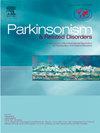Allogenic transplantation therapy of iPS cell-derived dopamine progenitors for Parkinson's disease –Current status of the Kyoto Trial and future perspectives–
IF 3.1
3区 医学
Q2 CLINICAL NEUROLOGY
引用次数: 0
Abstract
Transplantation therapy using induced pluripotent stem cell (iPS) cell-derived dopamine (DA) progenitors for Parkinson's disease (PD) has attracted attention as an innovative treatment to restore DA neurons in PD, which leads to the improvement of motor disturbance. iPS cells are multipotent stem cells with very high proliferation activity, created by reprogramming mature somatic cells through the transduction of four transcription factors. Relative to fetal midbrain DA neurons, iPS cells have advantages in terms of ethical aspects and availability. On the other hand, the most serious concern associated with therapies with ES/iPS cells is the risk of tumor growth that is caused by the proliferation of undifferentiated ES/iPS cells. Human ES cells that differentiate into DA neurons have been shown to form teratomas. Another concern is graft-induced dyskinesia (GID). GID, which is likely caused by several factors including contamination with serotonergic neurons, developed in the recipients of fetal ventral midbrain (VM) in randomized controlled trials. To enrich the DA progenitor cells and eliminate unwanted cells, a protocol for sorting midbrain DA neurons with antibodies against CORIN, a marker for floor plates, was developed. CORIN-sorted dopamine progenitors were transplanted into the bilateral putamina of MPTP-treated Parkinson models of cynomolgus monkeys, resulting in 18F-DOPA PET-positive graft formation and motor improvement without tumor formation two years after the surgeries. Very recently, a phase I/II trial of iPSC-derived, CORIN-sorted dopaminergic cells for Parkinson's disease was completed (The Kyoto Trial) (Takahashi, 2020; Sawamoto et al., 2025) [1,2]. Based on the results of the trial, we would like to discuss the current status and future perspectives of iPS cell therapy for PD.
iPS细胞衍生的多巴胺祖细胞的同种异体移植治疗帕金森病——京都试验的现状和未来展望
利用诱导多能干细胞(iPS)细胞来源的多巴胺(DA)祖细胞移植治疗帕金森病(PD)作为一种修复PD DA神经元,从而改善运动障碍的创新治疗方法受到了广泛关注。诱导多能干细胞是一种具有高增殖活性的多能干细胞,通过四种转录因子的转导对成熟体细胞进行重编程而产生。相对于胎儿中脑DA神经元,iPS细胞在伦理方面和可获得性方面具有优势。另一方面,与胚胎干细胞/多能干细胞治疗相关的最严重的问题是未分化的胚胎干细胞/多能干细胞增殖引起肿瘤生长的风险。分化为DA神经元的人类胚胎干细胞已被证明可形成畸胎瘤。另一个问题是移植物诱导的运动障碍(GID)。在随机对照试验中,胎儿腹侧中脑(VM)受体发生了GID,可能是由几种因素引起的,包括血清素能神经元的污染。为了丰富DA祖细胞和消除不需要的细胞,我们开发了一种针对CORIN抗体的中脑DA神经元分选方案。将corin分类的多巴胺祖细胞移植到mptp治疗的食蟹猴帕金森模型的双侧壳层,术后2年,18F-DOPA pet阳性移植物形成,运动改善,未形成肿瘤。最近,ipsc衍生的corin分类多巴胺能细胞用于帕金森病的I/II期试验完成(京都试验)(Takahashi, 2020;Sawamoto et al., 2025)[1,2]。基于试验结果,我们想讨论iPS细胞治疗PD的现状和未来的展望。
本文章由计算机程序翻译,如有差异,请以英文原文为准。
求助全文
约1分钟内获得全文
求助全文
来源期刊

Parkinsonism & related disorders
医学-临床神经学
CiteScore
6.20
自引率
4.90%
发文量
292
审稿时长
39 days
期刊介绍:
Parkinsonism & Related Disorders publishes the results of basic and clinical research contributing to the understanding, diagnosis and treatment of all neurodegenerative syndromes in which Parkinsonism, Essential Tremor or related movement disorders may be a feature. Regular features will include: Review Articles, Point of View articles, Full-length Articles, Short Communications, Case Reports and Letter to the Editor.
 求助内容:
求助内容: 应助结果提醒方式:
应助结果提醒方式:


